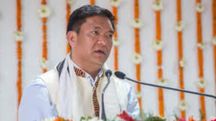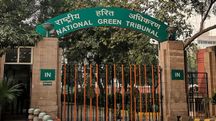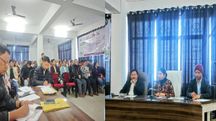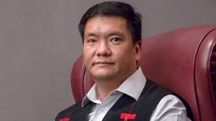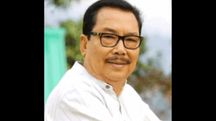‘Journalism must serve the people, not power’: Amar Sangno tells APSU students
Senior journalist Amar Sangno on Tuesday warned that misinformation becomes believable when repeated unchecked, stressing that journalism must remain a public service rather than a mouthpiece for any authority.
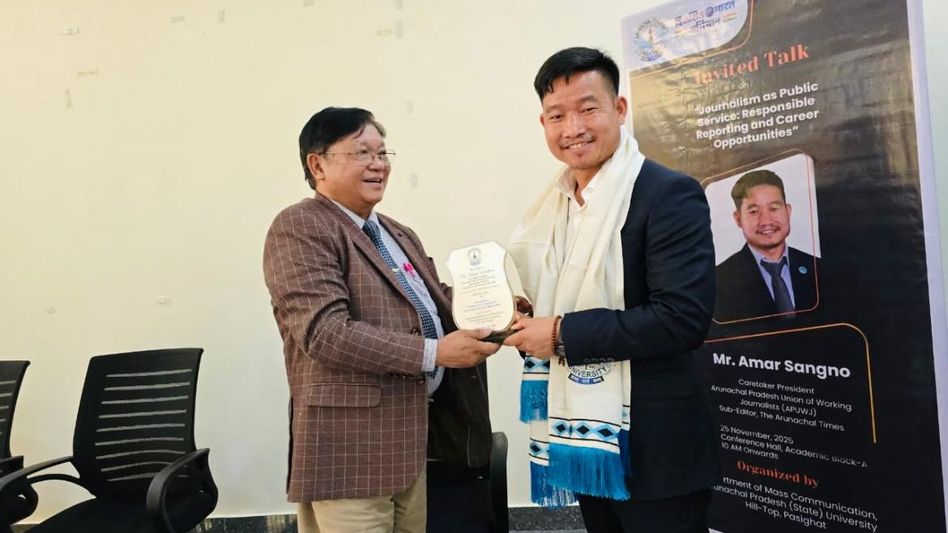
Senior journalist Amar Sangno on Tuesday warned that misinformation becomes believable when repeated unchecked, stressing that journalism must remain a public service rather than a mouthpiece for any authority.
Addressing students at Arunachal Pradesh State University (APSU) during an invited talk on “Journalism as Public Service: Responsible Reporting and Career Opportunities,” Sangno said, “Repeat a lie often enough, and it starts sounding like the truth — the illusion of truth. But journalism must rise above that.”
He cautioned that in an era where “anyone with a lapel mic and a smartphone claims to be a journalist,” the core mandate of the profession remains unchanged: presenting credible, verified information to citizens. Sangno, who is the Caretaker President of the Arunachal Pradesh Union of Working Journalists (APUWJ) and Sub-Editor at The Arunachal Times, spoke extensively on media ethics, misinformation, and the challenges and evolution of journalism in the state. He also congratulated APSU for establishing its Mass Communication Department, calling it a timely initiative that would strengthen Arunachal Pradesh’s media ecosystem. The official jersey of the department was launched on the occasion.
Chief Guest Prof. Tomo Riba, Vice Chancellor of APSU, underlined the indispensable role of responsible journalism in a democracy. He said the media must act as “a mirror that reflects truth, not a tool that amplifies distortion.” Emphasising media literacy, he urged students and faculty to remain discerning and critically aware of the information they engage with, expressing hope that the new department would grow into a strong academic unit contributing significantly to the state’s media landscape.
Registrar Narmi Darang highlighted the importance of ethical conduct in journalism, noting that the rapid expansion of digital media makes accuracy, fairness, and accountability more crucial than ever. During the technical session, Sangno shared practical insights drawn from his years in the newsroom, discussing ethical dilemmas, digital disruption, and the future of journalism in Arunachal Pradesh. He encouraged students to develop curiosity, courage, and compassion — qualities he said are essential for meaningful journalism — and reminded them that mass communication offers career paths far beyond reporting, including PR, advertising, digital content creation, and research.
Students participated actively in the interactive segment, raising questions on yellow journalism, gatekeeping, ethics, and career prospects. Sangno responded with field examples and urged them to “be part of the solution, not the noise.”
Dr. Kombong Darang, Assistant Professor in the Mass Communication Department, delivered the closing remarks, appreciating Sangno for his candid and insightful engagement. He said the session had broadened students’ understanding of the media profession and reinforced the department’s commitment to nurturing informed communicators.
Earlier, Dr. Prem Taba, Head (In-Charge) of the department, said the academic journey of the newly established unit began intentionally with industry professionals. “I wanted our students to learn from seasoned practitioners like Sangno, whose years of experience offer lessons no textbook can fully capture,” he said, expressing hope that the department would expand significantly in the coming years.
The programme was attended by Prof. P.C. Jena, Dean of Academic Affairs, departmental heads, faculty members, Assistant Registrars, and students from various departments.
Copyright©2026 Living Media India Limited. For reprint rights: Syndications Today
